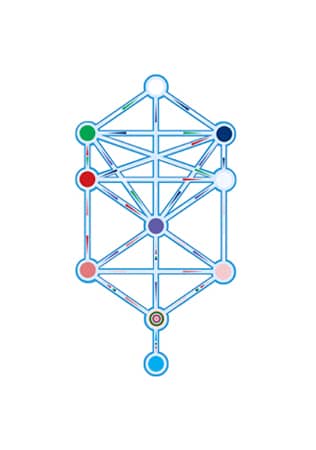Why Is G-d So Angry?
From my mailbox:
Dear Rabbi Jacobson,
I am an avid reader of your weekly e-mails and appreciate your personal and spiritual take on what otherwise would be for me irrelevant tradition. Having grown up in an observant home with no warmth or spirituality (and worse), I came to resent anything that was “dry ritual.” I therefore am very grateful to you for having opened up a resonating perspective that I never knew was there.
In this vein I would like to ask you how you would explain the many curses used in the Torah. What possible benefit – besides fear and alienation – can curses contain?
As you know, many people are easily turned away from Biblical thought when they read the terrible misfortunes that will befall people for their sins. It is demoralizing and creates the impression that G-d is a very angry entity, filled with wrath and vengeance.
Some would even argue that it is Rabbis like you who later came and “softened” up the Biblical version of G-d and turned it into a spiritual and loving relationship. But the G-d of the Bible doesn’t seem like someone you could or would want to have a relationship with?!
I am sorry for being so blunt or perhaps disrespectful, but I have learned from your writing that you welcome such questions and appreciate the direct approach rather than masquerades.
Thank you for listening,
[signed]
————–
Dear [signed],
Thank you for your trusting words, and yes, I do appreciate your direct question, and will respond in a more formal tone in the following essay on this week’s Torah portion.
This week’s Biblical Torah portion enumerates forty-nine (!) curses that will befall those that transgress the law (Leviticus 26:14-43).
For the record, this is the first of three places in the Torah where we read what is known as the “tochacha” (the admonition or rebuke), which describes the harsh consequences of forsaking the Divine commandments. The second and third are in the beginning and the end of the book of Deuteronomy (Devorim and Ki Tovo respectively).
Traditionally these sections are read quickly and in a lower tone than the rest of the Torah reading. No one is invited up to the Torah (in an “aliya”) for these sections. Instead, the Torah “reader” unceremoniously recites the blessings before and after the reading, but he is not called up.
Which of course brings us to the big question: Why would G-d want to curse His own children?!
A bizarre Talmudic story about Rabbi Shimon bar Yochai will help illuminate us. Rabbi Shimon once sent his son, Rabbi Elozor, to a couple of distinguished sages for a blessing.
The sages conferred upon him a strange string of “blessings:”
“May it be His will that you sow and not reap. That you bring in [merchandise] and not let out [sell it], and that you invest and not have a return. That your house be destroyed and your inn settled. That your table be confused and you should not see a new year.” (!!)
Rabbi Elozor returned to his father shocked: “Not only did they not bless me, he exclaimed, “they have caused me anguish!” “What did they tell you?” asked Rabbi Shimon. After Rabbi Elozor repeated their words, Rabbi Shimon reassured him: “All their words are really blessings!”
And he explained: “‘Sow and not reap’ means that you will have children who will not die in your lifetime. ‘Bring in and not let out’ means that you will bring in daughters-in-law [your children will marry] and your sons who married them will not die in their lifetime. ‘Invest and not have a return’ means that your daughters will marry and their husbands will not die, resulting in your daughters having to return home. ‘Your house be destroyed and your inn settled’ means that your grave (which is called a ‘house’) will not come to use and you will live long in this world which is compared to an inn. ‘Your table be confused’ with many sons and daughters. And ‘you should not see a new year’– your wife will not die and you will therefore not have to ‘see a new year,’ i.e. remarry and spend the ‘first year’ with a new wife.”
This episode is all nice and fine. But the commentaries are troubled by the obvious question: Why did the esteemed sages not bless Rabbi Elozor in open and direct terms, and instead cloaked their blessing in cryptic language that only Rabbi Shimon was able to decipher?!
Several different explanations are proffered:
- The sages did so in order to challenge and sharpen Rabbi Elozor (Maharsha).
- They did so in order to honor Rabbi Shimon, that he be the one that interprets, and thus blesses his son. In effect Rabbi Elozor would be blessed twice (Rif. Iyun Yaakov).
- A blessing is more effective when it isn’t pronounced out loud in public (three people is considered public) (Iyun Yaakov).
- They did so for Rabbi Elozor’s good. At times when a blessing is stated outright, the “voice of judgment” (of the “prosecuting angels”) challenges the merit of the recipient, questioning whether he truly deserves this blessing. The sages therefore disguised their blessing in language that sounds like a curse, knowing that the “prosecuting angels” cannot read their minds, so as not to provoke and stir up any resistance to these blessings (Nezer Hakodesh, cited in Eitz Yosef).
Even after all these explanations, it still seems odd that the sages would use the language of curses to convey a blessing! To elicit Rabbi Shimon’s interpretation or to mask their intentions from the “prosecutors” could have easily been achieved by using neutral language. Why the need to use terms that can seem “offensive”?! True, a blessing “disguised” as a curse is easier to “smuggle” by the forces of judgment, but it still requires explanation.
To understand the deeper meaning of these blessings dressed up in the “garments” of “curses” requires a penetrating look into the forces that lay beneath the surface of existence in general. Which will also explain why of all people it was Rabbi Shimon who illuminated the inner meaning of these blessings.
The deeper meaning – and inner dimension – of all experience is to be found in what is called the “inner wisdom.”
There are two types of wisdom, which correspond to two types of experience:
1) Conscious or revealed wisdom – which comprehends conscious or revealed experience. This is the wisdom of most sciences – physical, social and political – the understanding of our empirical and sensory experiences (what we see, hear, taste, touch and smell).
2) Unconscious or hidden wisdom – which relates to the unconscious and hidden dimensions of reality, the suprasensory energy that makes existence tick.
The Torah too has these two corresponding dimensions: The Outer Torah, it’s revealed dimension (nigleh), and the Inner Torah, hidden beneath the surface (nistar).
On the surface things may appear one way. Beneath the surface they may appear entirely different, sometimes even diametrically opposed as to the way they seem on the outside.
Take yourself as an example: How much of your outside (body language, facial expressions, conversations) expresses your inner self? Indeed, the deeper you travel into the intimate recesses of your psyche, the fewer words we have to express ourselves. Sometimes a laugh, a cry, an “oy-vey” expresses more than volumes can. On the deepest level silence is often the most profound expression of all (the “silent voice” in the words of the Zohar).
This is because the outer world and the inner world are two entirely different, even dichotomous, paradigms. How does your conscious match up with your unconscious? Do you even want to know?
Rabbi Schneur Zalman of Liadi (known as the Alter Rebbe, author of Tanya and founder of Chabad Chassidus), in his Likkutei Torah, uses this principle to explain that the “curses” in our Torah chapter are “in truth, nothing but blessings”, blessings in disguise.
On an ostensible level – the conscious, revealed dimension – they appear as curses. On this level they too serve a “blessed” purpose to attack the “negative” forces of existence. No one would consider it a curse when white blood cells mercilessly destroy harmful bacteria in order to protect the body from infection.
But in an even deeper dimension – in the unconscious, hidden dimension – the inner workings of these apparent “curses” are nothing but profound blessings, so profound that they can only be expressed in a concealed and disguised fashion. They are actually deeper blessings that the ones we can openly recognize! [Rabbi Schneur Zalman goes on to explain the blessings in some of the ostensible “curses” in our chapter].
The Tzemach Tzedek in his gloss on Likkutei Torah of his grandfather, Rabbi Schneur Zalman, equates this concept with the above related Talmudic story with the blessings “disguised” as curses: These blessings originate in the unconscious level of experience.
For this reason the blessings need to be concealed not in neutral terms but in “cursed” language: Only then are they truly concealed. The formula works like this: The more sublime and intimate the experience, the more concealed it is. Therefore, the most sublime blessings of all are couched in the most dreadful terms.
This also explains why Rabbi Shimon was the one to recognize the profound blessings bestowed on his son, Rabbi Elozor:
Rabbi Shimon is the primary source of the “Inner Torah.” Coupled with his Talmudic genius, Rabbi Shimon is the preeminent mystic of his times; the author of the Holy Zohar – the classic text of the inner wisdom of Kabbala.
Rabbi Shimon therefore was most fittingly able to see beneath the surface of the sages’ expressions and reveal their inner meaning – the profound blessings they carried, blessings that come from the “hidden” and “unconscious” cosmic levels, greater than blessings that are expressed in a revealed way.
One way to explain the power of Rabbi Elozor’s blessings: In foresight the sages saw that Rabbi Elozor in his lifetime would face difficult challenges with his children, including perhaps the horror of losing a child in his lifetime or other forms of premature deaths of children. In order to preempt any such tragedies, the sages ingenuously and intentionally used words that could sound like just such curses, so as to so-to speak “fulfill” (in physical expressions) these premonitions. But in truth they infused these words with the deeper meaning and intention of blessings, as spelled out by Rabbi Shimon. In effect, by using these negative expressions the sages bestowed the greatest of all blessings on Rabbi Elozor: They released him of his need to actually experience any such loss, and instead be blessed with good life and marriage for his and his children.
In practical terms that each of us can relate to, we too must recognize that in our lives we receive two types of blessings, corresponding to our two forms of experience: Conscious and unconscious.
There are blessings that are apparent and revealed for all to see. But then there are blessings that are camouflaged, sometimes in “garments” that don’t appear to the naked eye to be blessed.
But the naked eye is just that: Naked. It sees very little and understands even less.
These deeper blessings can take on the shape of formidable challenges in our lives. They can take on the shape of “special children” (as discussed in last week’s article), or perhaps a loss that at the moment seems irreplaceable.
Lest it be misunderstood, by all means we always ask for revealed blessings, and we deserve to see with our naked eyes the gifts of life. Yet, when we are faced with a seemingly insurmountable difficulty, never underestimate the possibility of it containing profound blessings, and your ability to reveal them.
Yes, after all is said and done, we were given the power to reveal the “unrevealable.” G-d created and gave us the resources, but He concealed them in this world of ours. Everything valuable in the world lies hidden. From precious stones to oil, from hidden potential to genius talents. We have the ability – and responsibility – to excavate these resources and bring them to the surface.
On Lag B’Omer, the yahrzeit and day of celebration of Rabbi Shimon Bar Yochai (also known by his acronym: Rashbi), his ability to see and reveal the inside becomes more accessible to us.
A concluding story:
As a child, Rabbi DovBer of Lubavitch, along with the rest of the congregation, would listen to the weekly Torah reading read by his father, Rabbi Schneur Zalman of Liadi. One year, his father was out of town on the Shabbat when the chapter Ki Tavo is read, a chapter that includes a section of admonition (not 49 but 98 curses). After hearing the Admonition read by the substitute Torah reader, the child was so emotionally upset that even a month later his father was unsure whether his son would be able to fast on Yom Kippur. The child was later asked, “Why were you not disturbed this way when the admonition was read in past years?” The child replied, “When father reads it, no curses are heard.”
Yes, it all depends on who’s doing the reading. We all project our attitudes on others. When “father reads” – the father that see the inner soul even in the darkest places – we hear blessings.
May we all open our ears to hear how “father” reads and reveals the profound blessings in all of our lives.









The Good Rabbi was wrong in giving you such an answer concerning the curses attributed to God in the Biblical text. Such an answer would serve better when considering the results of curses spoken upon God’s chosen people (“I will bless those who bless you and curse those who curse you”).
And you were wrong for using pity as well as flattery to acquire an answer that would be agreeable to you from the Rabbi.
May I suggest that you stop wallowing in yourself. Everyone has their excuses. But there comes a time when we must stop looking for reasons to skirt responsibility, justify ourselves, or blame God for our ignorance and thus call Him “an angry entity filled with vengeance.” Do you not realize the great privilege of having a Real and True God WANT YOU? Have you not read or considered all of the many blessings that come when you choose the Real God? Why do you place your first consideration on the curses? Do you not realize that the curses are for those who reject God, NOT, those who seek Him? Do you also not realize that the blessings are always given BEFORE the curses? It all comes down to the one standing between the two… each of us are told the choice is ours… “choose this day” will you CHOOSE the blessing or the curse? It’s totally up to you. God will not force Himself or His ways on you. Thus, God will not force His blessings upon you either.
If you choose the blessing, then show gratitude to the Giver. If you choose the curse, blame only yourself… don’t blame God for your choices. If you were to read the blessings and commit to seeking the Source of all of those good things, you would never have to fear any curse. Right now you fear yourself. Choose instead to fear God and be blessed.